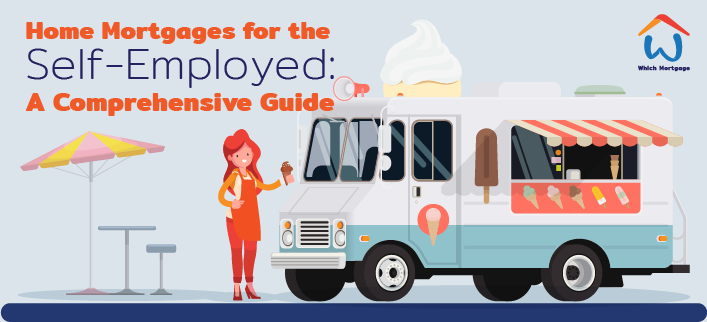
Can I Get a Mortgage? Understanding Eligibility and Requirements
2024-07-26Starting the home buying journey can be daunting, especially when it comes to understanding the mortgage process. At Which Mortgage, we're dedicated to offering guidance to help you navigate this complex landscape with confidence. In this guide, we'll walk you through assessing your mortgage eligibility, the steps required to qualify and the critical role of mortgage pre-approval.
Assessing Your Mortgage Eligibility
There are basic eligibility criteria lenders consider when assessing your application, such as:
- Age: You must be at least 18 years old to apply for a mortgage. Your age will also influence the mortgage term available as a lender will look at your proximity to retirement and often offer a mortgage term that spans over a period up to the age of 66 or 67.
- Employment Status and Income: You will not be eligible for a mortgage if you are unemployed and you will, therefore, be required to provide proof of employment and income.
- Credit History: When determining your borrowing and repayment capacity, a lender will assess your credit history to ascertain your financial habits. A good credit history can strengthen your application, while a record of missed payments can negatively impact your eligibility.
Essential Steps to Qualify for a Mortgage
Applying for a mortgage is a significant financial commitment that requires thorough preparation. Here are the key factors to consider when preparing to apply for your mortgage:
- Work Out How Much You Can Borrow: The amount of money you can borrow to buy a home is set by the Central Bank's Loan-to-Income (LTI) Limit. In terms of the LTI limit, first time buyers can borrow up to a maximum of 4 times their annual income.
- Calculate Your Mortgage Repayments and Assess Your Monthly Expenses: Use our First Time Buyer Mortgage Calculator to estimate your monthly repayments. This will give you a better understanding of your budget, which will enable you to demonstrate to a lender that you can afford the repayments from your current income. When determining your repayment ability, a lender will also look at your rent and savings, so these should add up to the monthly mortgage repayments. Further, a lender will consider your fixed monthly expenses, such as childcare and maintenance/support payments, to ensure that you can manage your mortgage repayments alongside these ongoing costs.
- Save for a Deposit: The deposit amount you are required to have before you can secure a mortgage is set by the Central Bank's Loan-to-Value (LTV) Limit, which requires first time buyers to have a minimum deposit of 10% of the home's purchase price.
- Existing Loans: While having debt does not automatically preclude you from securing a mortgage, excessive debt may affect your borrowing capacity. Reducing existing loans improves your chances of securing a mortgage. It is important that you prioritise reducing short-term debt such as credit cards and overdrafts, as lenders do not view these favourably.
The Importance of Mortgage Pre-Approval
Mortgage pre-approval, or Approval in Principle (AIP), typically serves as the foundation for the official loan offer. While your AIP does not guarantee a mortgage or specific deal, in many instances, estate agents and auctioneers often request that you have an AIP as proof that you have funds to acquire the home you are looking to buy.
Steps to Get Pre-Approved
- Gather Necessary Documents: Your application will comprise of documents such as your passport copy, utility bills, employment details, payslips, bank statements, loan accounts and credit card statements.
- Submit Application: Our mortgage specialists will help compile and submit your application to your lender of choice.
- Receive AIP: Once your application has been reviewed and approved by the lender, you can start house hunting with confidence. Your AIP is typically valid for 6 to 12 months.
Tips for First-Time Home Buyers
Getting your finances in order is crucial for mortgage approval. Demonstrate good financial habits like living within your means, saving regularly, managing debt, and maintaining a stable income. Here are some tips to improve your chances of securing a mortgage:
- Avoid Red Flags: Steer clear of frequent overdraft use, clear credit card debt, and ensure all your loan repayments are timely. Frequent overdrafts indicate financial strain, which can affect your mortgage eligibility.
- Increase Deposit Savings: Save more than 10% to cover additional costs like solicitor's fees, valuation costs, and stamp duty. Set up a savings plan with a standing order for consistent saving. Your deposit can include savings, financial gifts, and funds from foreign accounts.
- Maintain Stable Employment: Ensure consistent income. If you're in full-time, permanent employment, avoid changing jobs while preparing for your mortgage. If you are self-employed, keep accurate financial records to show income stability.
- Leverage Government Supports: Use supports like the Help to Buy (HTB) Scheme and First Home Scheme (FHS). The HTB can provide up to €30,000 towards your deposit, while the FHS can contribute up to 30% of your home's cost, bridging the gap between your deposit, mortgage, and purchase price. You can use both schemes together and when you do, FHS funding will be limited to 20%.
Navigating the mortgage process can be time-consuming and requires significant effort, but the sense of accomplishment when you receive the keys to your first home makes it all worthwhile. Consulting with our mortgage specialists will help you make informed decisions and enhance your chances of a successful application.
Contact us today for personalised advice and assistance with your mortgage needs.
More Questions?
Talk to one of our mortgage specialists now!
BOOK AN APPOINTMENT


